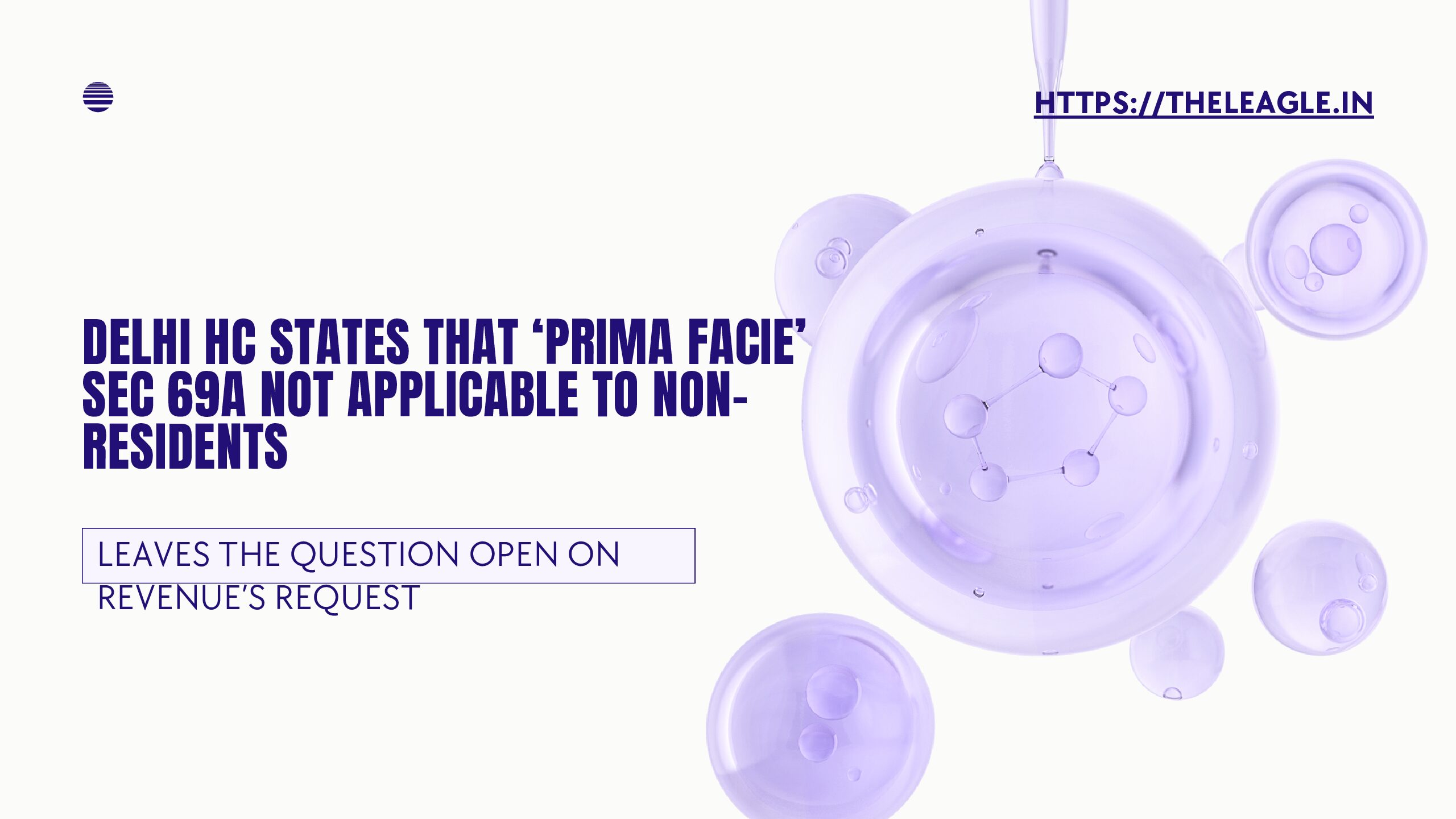In a recent decision[1], the Delhi High Court heard an appeal from an order of the Income Tax Appellate Tribunal (‘Tribunal’) where the Tribunal had held that Section 69A, IT Act, 1961 was not applicable to the facts of the case. Accordingly, one of the questions of law that the High Court had to adjudicate was if the Tribunal was correct in holding that Section 69A was inapplicable to the facts of the case. The Revenue Department requested that the High Court may leave open the question for it to be deliberated upon in some other case. The High Court acceded to the request, but still made ‘prima facie’ observations on Section 69A and it is unclear if they will have precedential value.
Facts
The assessee, a non-resident living in the United Arab Emirates filed the income tax returns for the Assessment Year 2017-18 declaring income which included savings bank interest and interest on income tax refund. During scrutiny proceedings, the Assessing Officer added additional sum under Section 69A, IT Act, 1961 on account of unexplained entries in the bank account and underreporting of income through interest. The assessee filed an appeal against the addition made by Assessing Officer which was partly allowed by the Commissioner of Income Tax. On second appeal, the Tribunal completely deleted the addition made under Section 69A. The Revenue filed an appeal against the Tribunal’s decision before the High Court.
High Court’s Observations
Before I mention that High Court’s observations, it is pertinent to mention Section 69A:
Where in any financial year the assessee is found to be the owner of any money, bullion, jewellery or other valuable article and such money, bullion, jewellery or other valuable article is not recorded in the books of account, if any, maintained by him for any source of income, and the assessee offers no explanation about the nature and source of acquisition of the money, bullion, jewellery or other valuable article, or the explanation offered by him is not, in the opinion of the Assessing Officer, satisfactory, the money and the value of the bullion, jewellery or other valuable article may be deemed to be the income of the assessee for such financial year. (emphasis added)
The Tribunal noted that the ingredients of Section 69A were not fulfilled in the impugned case as the non-resident was not obliged to and had not maintained books of account, thereby a crucial ingredient of Section 69A was missing. Even on merits, the assessee’s explanation that the entries in the bank account were from his other account in Dubai and the money received on cancellation of a hotel booking and some money was deposited during demonetization was accepted by the Tribunal. The High Court noted that the Tribunal had meticulously examined the facts, the assessee’s explanation was held to be satisfactory and thus the additional money cannot be treated as unexplained money under Section 69A. The High Court refused to interfere in Tribunal’s findings on this matter.
As regards applicability of Section 69A, the Revenue’s argument was that if the Tribunal’s observation is accepted, i.e., the provision is not applicable to non-residents, if would sanctify the non-maintenance of books by such assessees. (para 5) On this issue, the High Court opined as follows:
Admittedly, in the present case, the respondent/assessee is a Non- Resident Indian and his source of income in India being from interest on bank accounts and interest on income tax refund, he is not obliged to maintain any books of account in India. It appears to us prima facie that the expression “if any” specifically used in Section 69A of the Act amplifies that where books of account are not maintained, it would not be possible to invoke this provision. But as mentioned above, learned counsel for appellant/revenue requested to keep this question open to be agitated in some better case. We accede to this request. (emphasis added) (para 7)
The Delhi High Court seems to have tentatively agreed to the Tribunal’s view, i.e., in the absence of books of account, Section 69A cannot be invoked. And a non-resident assessee is not obliged to maintain the books of account. This leads to the conclusion that Section 69A cannot be invoked against a non-resident assessee. This is the correct position of law. However, given that the Revenue expressly requested the High Court leave the question of applicability of Section 69A to the impugned case open and the High Court agreed to it, the above observations of the High Court should be treated as obiter dicta. Also, the preface of ‘prima facie’ to the High Court’s observations and the general tenor of the High Court’s observations supports the conclusion that the High Court’s opinion on applicability of Section 69A is not a fully reasoned opinion and should not be treated as a binding precedent.
Conclusion
Ideally, the Delhi High Court should have refrained from giving its ‘prima facie’ opinion on the scope and applicability of Section 69A in the impugned case since it agreed to the Revenue’s request to leave the question for deliberation in a subsequent case. However, even though the High Court has expressed it’s tentative opinion on the matter, it is important to treat the above observation as obiter dicta and not the final opinion on applicability and scope of Section 69A.
[1] The Commissioner of Income Tax v Hersh Washesher Chadha 2023:DHC:8854-DB.
